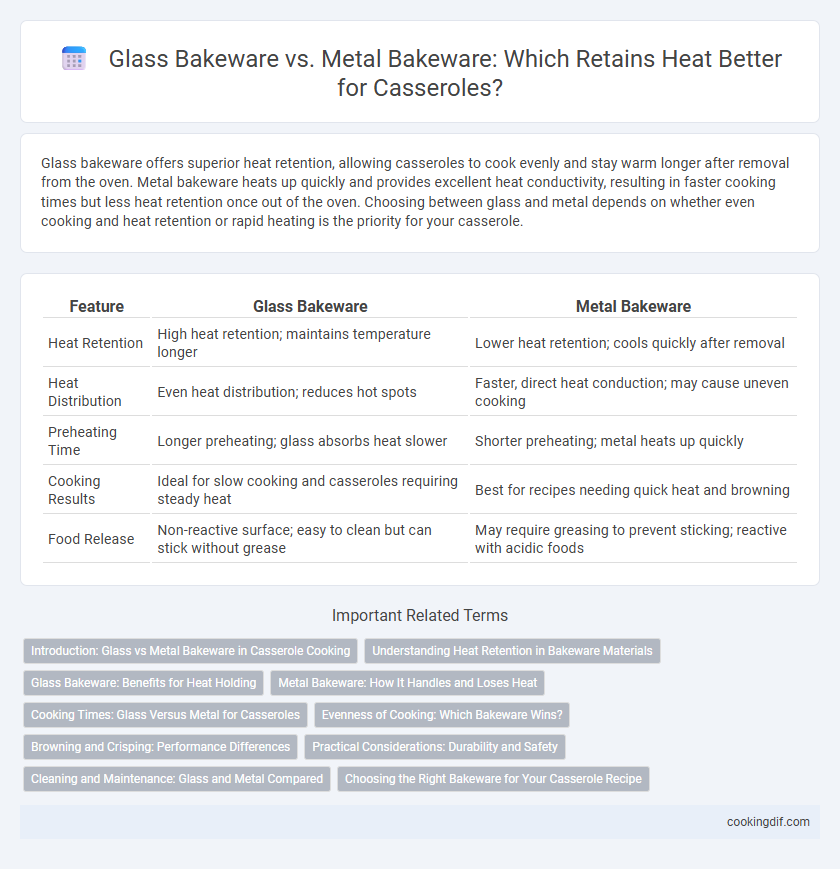Glass bakeware offers superior heat retention, allowing casseroles to cook evenly and stay warm longer after removal from the oven. Metal bakeware heats up quickly and provides excellent heat conductivity, resulting in faster cooking times but less heat retention once out of the oven. Choosing between glass and metal depends on whether even cooking and heat retention or rapid heating is the priority for your casserole.
Table of Comparison
| Feature | Glass Bakeware | Metal Bakeware |
|---|---|---|
| Heat Retention | High heat retention; maintains temperature longer | Lower heat retention; cools quickly after removal |
| Heat Distribution | Even heat distribution; reduces hot spots | Faster, direct heat conduction; may cause uneven cooking |
| Preheating Time | Longer preheating; glass absorbs heat slower | Shorter preheating; metal heats up quickly |
| Cooking Results | Ideal for slow cooking and casseroles requiring steady heat | Best for recipes needing quick heat and browning |
| Food Release | Non-reactive surface; easy to clean but can stick without grease | May require greasing to prevent sticking; reactive with acidic foods |
Introduction: Glass vs Metal Bakeware in Casserole Cooking
Glass bakeware offers superior heat retention, allowing casseroles to cook evenly and maintain warmth longer after being removed from the oven. Metal bakeware heats up quickly and provides sharp, even browning but loses heat faster once out of the oven. Choosing between glass and metal depends on whether consistent heat retention or rapid heating is more important for the casserole recipe.
Understanding Heat Retention in Bakeware Materials
Glass bakeware retains heat longer due to its dense, non-conductive properties, making it ideal for evenly cooked casseroles that stay warm after removal from the oven. Metal bakeware, particularly aluminum and stainless steel, heats up quickly but cools faster, providing rapid temperature adjustments that benefit dishes requiring quick temperature changes. Selecting the appropriate bakeware depends on whether consistent heat retention or swift heat response is preferred for the casserole being prepared.
Glass Bakeware: Benefits for Heat Holding
Glass bakeware offers superior heat retention compared to metal, ensuring even cooking and maintaining warmth longer after removal from the oven. Its ability to hold heat makes it ideal for casseroles that require slow cooking or serving straight from the dish to the table. Unlike metal bakeware, glass distributes heat gradually, reducing the risk of hot spots and promoting consistent texture and flavor in baked casseroles.
Metal Bakeware: How It Handles and Loses Heat
Metal bakeware, such as aluminum or stainless steel, heats up quickly and conducts heat efficiently, making it ideal for achieving crisp, evenly-browned casseroles. However, metal cools down faster once removed from the oven, resulting in quicker heat loss compared to glass bakeware. This rapid heat dissipation requires careful monitoring during resting time to maintain the desired temperature and texture of dishes.
Cooking Times: Glass Versus Metal for Casseroles
Glass bakeware retains heat longer than metal, resulting in slower, more even cooking and potentially longer overall cooking times for casseroles. Metal bakeware heats up quickly and cools down fast, which can lead to shorter cooking times but requires close monitoring to prevent overcooking or burning. Choosing between glass and metal bakeware affects heat distribution and cooking duration, where glass offers steady heat retention ideal for thorough cooking, while metal provides rapid heat transfer suitable for faster cooking.
Evenness of Cooking: Which Bakeware Wins?
Glass bakeware retains heat more efficiently, promoting even cooking and consistent browning, especially for casseroles that require steady temperature. Metal bakeware heats up and cools down faster, which can lead to hot spots and uneven cooking but allows for quicker temperature adjustments. For casseroles needing gradual, uniform heat distribution, glass bakeware offers superior evenness of cooking compared to metal.
Browning and Crisping: Performance Differences
Glass bakeware retains heat more evenly, resulting in consistent browning and crisping of casseroles, while metal bakeware heats faster and promotes sharper, more pronounced browning and crisp edges. Metal bakeware's superior heat conduction allows for better Maillard reaction, enhancing caramelization and texture. Glass bakeware, however, cools slower, keeping dishes warmer longer without over-browning.
Practical Considerations: Durability and Safety
Glass bakeware offers excellent heat retention, distributing heat evenly for consistent cooking, but it is more prone to breaking or chipping under sudden temperature changes, requiring careful handling. Metal bakeware, particularly aluminum or stainless steel, provides superior durability and resistance to warping, making it a safer choice for frequent high-temperature use. Both materials are generally safe for food use, but glass is non-reactive and ideal for acidic dishes, while metal can sometimes react with certain ingredients, affecting flavor.
Cleaning and Maintenance: Glass and Metal Compared
Glass bakeware offers superior heat retention and even cooking but typically requires gentler cleaning methods such as soaking and non-abrasive scrubbers to prevent scratching. Metal bakeware, especially aluminum or stainless steel, heats up quickly and cools faster but is more durable for scrubbing and generally dishwasher safe, making maintenance easier. Choosing between glass and metal bakeware depends on balancing heat retention with the preferred ease of cleaning and long-term durability.
Choosing the Right Bakeware for Your Casserole Recipe
Glass bakeware offers superior heat retention, allowing casseroles to cook evenly and stay warm longer after removal from the oven. Metal bakeware heats up quickly and promotes browning but cools down faster, which can affect the texture of dishes like casseroles. Selecting glass bakeware enhances slow, consistent cooking, while metal is ideal for recipes needing crisp edges and faster heat response.
Glass bakeware vs metal bakeware for heat retention Infographic

 cookingdif.com
cookingdif.com